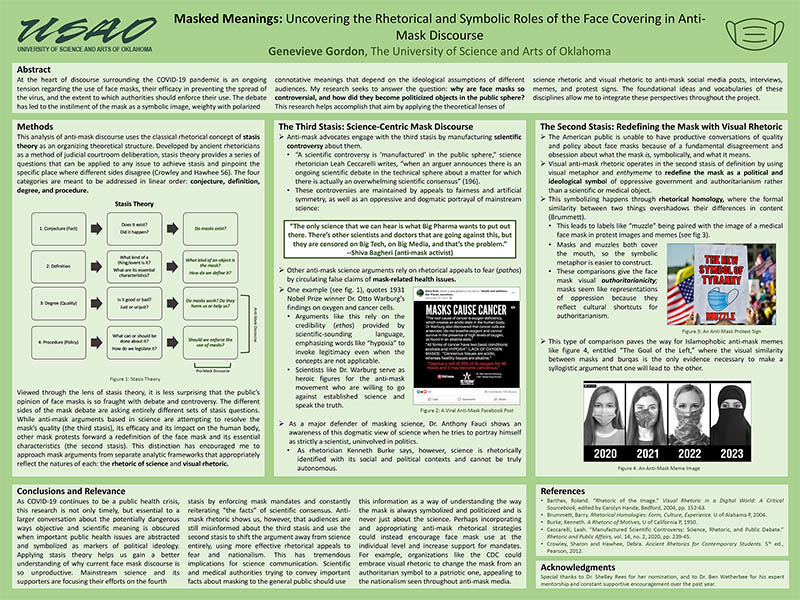
Hover to pan and click to magnify. Click again to pan at full screen.
Genevieve Gordon, Dept. of English, University of Science and Arts of Oklahoma, Chickasha, OK. Faculty Advisor, Dr. Ben Wetherbee, University of Science and Arts of Oklahoma, Chickasha, OK.
Genevieve Gordon, Dept. of English, University of Science and Arts of Oklahoma, Chickasha, OK. Faculty Advisor, Dr. Ben Wetherbee, University of Science and Arts of Oklahoma, Chickasha, OK.
ABSTRACT
At the heart of discourse surrounding the COVID-19 pandemic is an ongoing tension regarding the use of face masks, their efficacy in preventing the spread of the virus, and the extent to which authorities should enforce their use. The debate has led to the instilment of the mask as a symbolic image, weighty with polarized connotative meanings that depend on the ideological assumptions of different audiences. One audience views the mask as representative of oppression, blind obedience, and forced anonymity, while another understands mask-wearing as a gesture of precaution, courtesy, and community solidarity. The mask serves as the epicenter of ideological divisions that continually fight to attach to it their respective commonplaces and beliefs about the pandemic. The aim of this research is to examine how the mask functions rhetorically and how it mobilizes ideology and aids in the production of rhetorical arguments that shape public opinion about masks and the COVID-19 pandemic in general.
In my research, I will view mask discourse through several lenses of rhetorical analysis, including rhetorical theory on ideology, visual rhetoric, and the intersection of rhetoric and science. The foundational ideas and vocabularies of these disciplines, like those of literary critic Roland Barthes and science rhetorician Leah Ceccarelli, will help me integrate these perspectives throughout the project. Tapping into these already rich scholarly conversations—and placing them in conversation with one another—will allow me to get closer to a holistic understanding of the face mask’s rhetorical significance and potency. The Classical rhetorical model of stasis theory will function as my project’s organizing structure, helping explicate at what points our public discourse about face masks is breaking down. The results of this project will ultimately express how the rhetorical use of the face mask has compromised the public’s trust in its effectiveness and hindered COVID-19 precaution efforts and offer potential solutions for science communicators. This research is not only timely, but essential to a larger conversation about the potentially dangerous ways objective and scientific meaning is obscured when important public health issues are abstracted and symbolized as markers of political ideology.

DISQUS COMMENTS WILL BE SHOWN ONLY WHEN YOUR SITE IS ONLINE